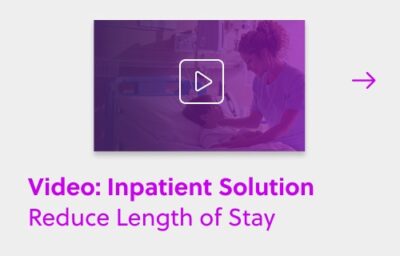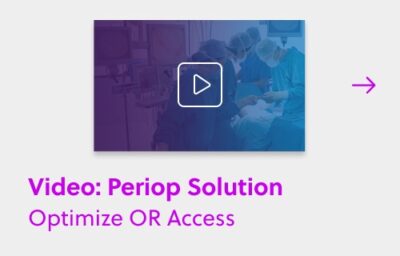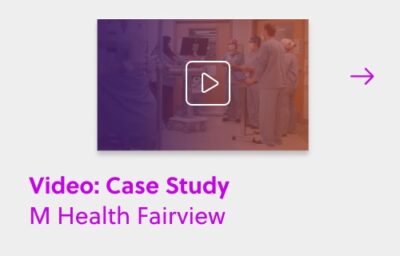We recently announced the launch of our new platform capability, AI Operational Assistants.
This new capability helps frontline healthcare workers unlock efficiencies that reduce the amount of time spent on administrative tasks and empowers them to spend more time working at the top of their license. Simply put, it’s like giving every healthcare worker a personal admin.
I had the opportunity to sit down with Qventus Co-Founder and CEO Mudit Garg to ask him a few questions about this new capability and what it means for health systems, healthcare workers, and patients.
Why did Qventus build this capability?
Qventus’ mission has always been to automate healthcare operations, and that includes supporting the people who sit between where healthcare technology stops and a lot of outcomes live. I call these “glue roles”—care coordinators, case managers, care navigators, pre-admission testing nurses, as well as roles like social workers, medical assistants, and schedulers. What defines this group is that they all have a solid understanding of both clinical pathways and operational or logistical needs. But the vast majority of their time is spent on these logistical tasks: making phone calls, sending and receiving faxes (yes, faxes!), chasing down patient charts, and documenting items in the EHR. It’s necessary work, but at the end of the day, these frontline healthcare workers aren’t able to focus on what matters to them most: caring for patients.
We’ve observed thousands of rounds with people who operate in these “glue roles” at hospitals across the country, and one thing is abundantly clear: if healthcare staff has the time, energy, and resources to really connect with their patients, we can provide the consistent, reliable, and high-quality guidance, support, and care coordination that, up until now, has been so hard to scale in a meaningful way.
How does the technology work?
It starts with the data. Thanks to our 12-plus years in the AI healthcare space, we have a wealth of data that sheds light on every step of the patient and provider care journey. We then train, and continuously re-train our models based on our specific customer’s hospital and their staff. Localized data models are key to make these assistants truly helpful to the workers they’re supporting. Leveraging this data, we can predict what will happen.
Then, we know what an individual care team member should do based on that prediction. Next, we make it easy for them to complete that task. But finally, and most importantly, we actually take many of these manual tasks off their plates, multiplying our capacity to drive impact. Our AI Operational Assistants can listen, speak, read, write, understand, and interact with the world, reducing clinician burden in a meaningful way.
What are some practical applications of the AI Operational Assistants?
There are so many, but a few examples we are exploring right now include:
- Pre-surgery coordination: It’s Friday afternoon. The clock is ticking and a pre-admission testing (PAT) nurse is working hard to clear a patient for their Monday morning surgery. The patient’s records come in via fax. While wading through a hundred-plus-page fax of a patient’s record, the nurse flags that the patient may not get cardiac clearance. Now, they’re desperately trying to contact the patient’s cardiologist to ensure it’s safe to put the patient under anesthesia. Monday’s surgery may be postponed if the nurse cannot get the information from the cardiologist’s office. And, by the way, the nurse has 10 other patients in similar scenarios that he or she needs to work through. Qventus’ AI Operational Assistant calls the cardiologist office, collects and automatically uploads necessary reports or documents such as a pacemaker interrogation report. By completing PAT tasks like this, the AI Operational Assistants help nurses avoid hours of tedious chart chasing and focus on higher risk patient interactions and prep.
- Patient discharge: Nurses spend an inordinate amount of time coordinating hospital discharges. Does the patient need a ride home? A follow-up appointment with their primary care physician? A placement at a skilled nursing facility? All these tasks are necessary, and all are time consuming. Our AI Operational Assistants can shoulder the burden, helping manage the discharge details that eat up hours of valuable time.
- Upstream care coordination: Each patient is unique. And most patients have more complex healthcare needs than just what is being addressed in a single surgery or ED visit. Yet overburdened frontline healthcare workers simply don’t have the time to complete social determinants of health screenings and connect patients with the programs that could help them gain stability, build healthy habits, and find wraparound support. Our AI Operational Assistants can fill in the gaps in this important work, reaching out to patients authentically and opening doors to a more holistic care experience.
Why is Qventus uniquely positioned to deliver this technology?
Our new AI Operational Assistants are 100% aligned with our mission of automating healthcare operations to improve care. This latest technology opens up a whole range of areas for impact. It’s one of the most exciting developments for Qventus both at the platform level and because it unlocks so many new solution opportunities.
Over our last 12 years working at the intersection of AI and healthcare, we’ve amassed an incredible amount of data about healthcare operations and workflow inefficiencies. We’ve partnered with innovative hospital systems across the country, including Ardent Health, Allina Health, HonorHealth, and Northwestern Medicine, to name a few, who are road-testing this latest technology, and it’s already promising big results.
We anticipate up to a 50% productivity boost for care operations roles while improving outcomes significantly, and that’s just the beginning. Because we locally train and retrain our AI models based on each customer’s hospital and patient population, this capability is uniquely positioned to deliver value for their frontline healthcare workers.
We look forward to rolling out real-world solutions powered by this technology that help ensure frontline healthcare workers can operate at the top of their license, while patients get the high-quality, wraparound care they deserve.


